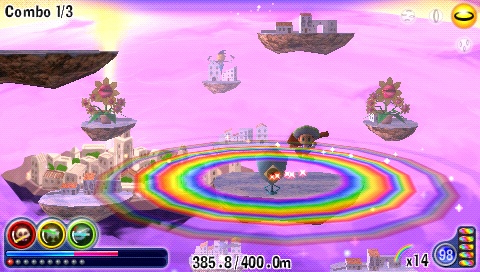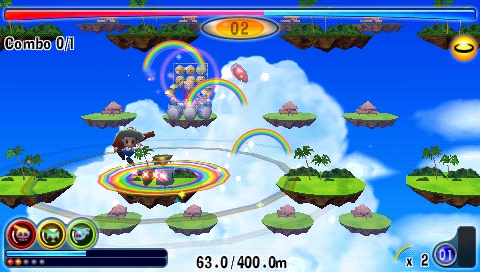Reinventing a classic arcade game can be a tricky business. Developers have to stick close enough to what made the original formula so compelling while introducing enough novel mechanics to entice new people to try out the game. Unfortunately, Rainbow Islands Evolution succeeds at neither endeavor, alienating fans of the original Rainbow Islands by creating a slow, monotonous trek that does little to appeal to a new audience. Although the essential rainbow-throwing, climb-to-the-top mechanics remain intact, Evolution turns a classic 8-bit platformer into a tedious game that simply isn't fun.

As Bubby and Bobby, you must climb to the top of the Rainbow Islands to save imprisoned songwriters held captive by the evil Million Records company. The terrible music churned out by these brainwashed artists has poisoned the ecosystem, mutating its inhabitants and breaking up the landscape. Only magical rainbows from your hurdy-gurdy can change your friends back to normal. Although told through charming storybook sequences, the plot serves merely as an inane explanation for how this remake relates to the original Rainbow Islands.
What made the original game so much fun was its hectic pacing as you raced to the top of the screen, using your rainbows to climb higher and take out the many enemies scattered throughout the levels. Evolution emphasizes exploration over speed by adding three layers to each stage that can only be traversed at predetermined intervals by jumping on platforms that move between the background and foreground. Enemies are scarce, and when they do appear, it's often in a different layer where they can shoot projectiles at you without much fear of retaliation. Rotating the analog stick summons a resonator that fires rainbow wheels into the background, but it's difficult to judge their trajectory, and you'll rarely aim correctly. Adding to this needless complexity, both your character and the resonator can be leveled up by finding hidden items strewn throughout the different layers. Having to search for these items, the moving platforms, and enemies quickly becomes repetitive.
Defeating each of the bosses--who also interrupt your progress throughout the levels--relies on the resonator mechanic as well. You'll find yourself frantically jumping from platform to platform, in and out of the screen, or rotating the analog stick as fast as you can with the hope that one of your rainbow wheels lands a hit. Every boss fight is the same, and they are all frustrating endeavors. Rushing to the top of the level usually allows you to skip these encounters, and the only motivation to defeat midlevel bosses is the ability to warp to a higher point or level up your resonator. Still, this doesn't help the game's slow, plodding pace.
As you make your way up the levels, you'll find that the game's noninteractive tutorial has not prepared you for its imprecise controls. Too often, your character will fall off his own rainbows or unintentionally jump through platforms directly into the path of an enemy. Ultimately, how fast or slowly you're able to rotate the analog stick won't matter because the resonator is equally unresponsive in either case. Rainbow Islands also takes a nod from its spiritual predecessor, Bubble Bobble, allowing you to shoot a homing bubble and dispatch precariously placed enemies. Unfortunately, these homing bubbles often miss their targets, which defeats the purpose of including the mechanic altogether.
With vibrant, colorful graphics and a catchy soundtrack, the original Rainbow Islands was undeniably charming. It's therefore all the more disappointing that what could have been Evolution's biggest strength is actually held back by poor design choices. None of the enemies will be recognizable to fans, with Bub and Bob having received some questionable style updates. Besides some minor color variation in their sombreros, the two are indistinguishable. Dull, sparse backgrounds add to the dreary style along with a grating, monotonous soundtrack that you'll quickly want to turn off.

The biggest problem with Evolution is that it fails to capture the frantic action of Rainbow Islands. You can unlock time-trial versions of each level that make a valiant effort to simulate the original arcade feel. However, by the time your character is powerful enough to sprint to the top, you'll have lost interest altogether. The multiplayer mode offers a similar race to the clouds, but it feels tacked on to the game. A two-player cooperative mode would have gone a long way toward pleasing nostalgic fans.
Rainbow Islands Evolution stands as a missed opportunity to reinvigorate a beloved franchise. Its slow pacing and monotonous gameplay mechanics make Evolution difficult to recommend. Nostalgic fans will want to look elsewhere for their 8-bit fix, and those who are unfamiliar with the franchise should seek out the original, more exciting version.